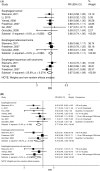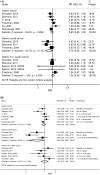An update of the WCRF/AICR systematic literature review on esophageal and gastric cancers and citrus fruits intake
- PMID: 27153845
- PMCID: PMC4923099
- DOI: 10.1007/s10552-016-0755-0
An update of the WCRF/AICR systematic literature review on esophageal and gastric cancers and citrus fruits intake
Abstract
Purpose: The 2007 World Cancer Research Fund/American Institute for Cancer Research expert report concluded that foods containing vitamin C probably protect against esophageal cancer and fruits probably protect against gastric cancer. Most of the previous evidence was from case-control studies, which may be affected by recall and selection biases. More recently, several cohort studies have examined these associations. We conducted a systematic literature review of prospective studies on citrus fruits intake and risk of esophageal and gastric cancers.
Methods: PubMed was searched for studies published until 1 March 2016. We calculated summary relative risks and 95 % confidence intervals (95 % CI) using random-effects models.
Results: With each 100 g/day increase of citrus fruits intake, a marginally significant decreased risk of esophageal cancer was observed (summary RR 0.86, 95 % CI 0.74-1.00, 1,057 cases, six studies). The associations were similar for squamous cell carcinoma (RR 0.87, 95 % CI 0.69-1.08, three studies) and esophageal adenocarcinoma (RR 0.93, 95 % CI 0.78-1.11, three studies). For gastric cancer, the nonsignificant inverse association was observed for gastric cardia cancer (RR 0.75, 95 % CI 0.55-1.01, three studies), but not for gastric non-cardia cancer (RR 1.02, 95 % CI 0.90-1.16, four studies). Consistent summary inverse associations were observed when comparing the highest with lowest intake, with statistically significant associations for esophageal (RR 0.77, 95 % CI 0.64-0.91, seven studies) and gastric cardia cancers (RR 0.62, 95 % CI 0.39-0.99, three studies).
Conclusions: Citrus fruits may decrease the risk of esophageal and gastric cardia cancers, but further studies are needed.
Keywords: Citrus fruits; Esophageal cancer; Gastric cancer; Meta-analysis; Systematic literature review.
Figures


References
-
- Steevens J, Botterweck AA, Dirx MJ, van den Brandt PA, Schouten LJ. Trends in incidence of oesophageal and stomach cancer subtypes in Europe. Eur J Gastroenterol Hepatol. 2010;22(6):669–678. - PubMed
Publication types
MeSH terms
Supplementary concepts
LinkOut - more resources
Full Text Sources
Other Literature Sources
Medical

